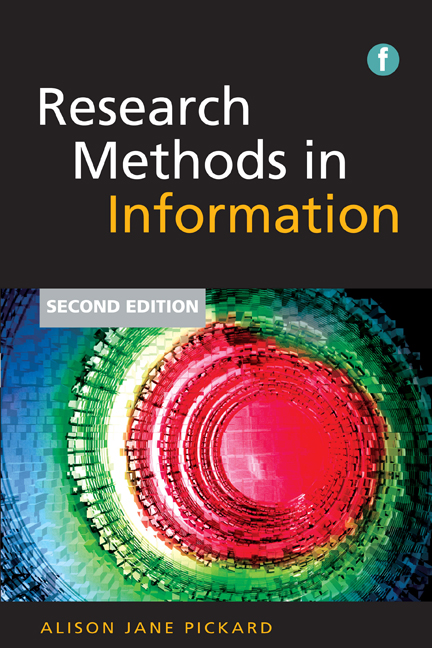Part 2 - Research methods
Published online by Cambridge University Press: 08 June 2018
Summary
Part 2 focuses on research methods, which we have already defined as the bounded system created by the researcher to engage in empirical investigation, the overall approach to the investigation. Often the choice of method is dictated by a number of factors, not least of which is the individual researcher's own paradigm preference. That said, very often external forces can drive our choices – the purpose of the research, the audience, resource constraints and so on. This second part describes and illustrates eight research methods. I am not claiming these are the only methods available but they are by far the most commonly used; some are more common than others within information and communication-related fields. I accept that what follows will have other labels within the research methods literature; they may be referred to as research strategies, research approaches or methodologies. I have already explained why I have chosen this particular terminology and can only say that, particularly for neophyte researchers, this has proved to be a logical approach to organizing an empirical investigation.
Part 2 will focus on defining, designing and conducting eight research methods. In any single research study it is possible to use one or more of these methods. A single study is not restricted to a single method; depending on the purpose of the research and the resources available more than one method may be applied to the research design: ‘Methods are selected because they will provide the data you require to produce a complete piece of research. Decisions have to be made about which methods are best for particular purposes and then data-collecting instruments must be designed to do the job’ (Bell, 1999, 101).
During the planning stages for this book I had intended to discuss online research in every chapter, looking at a ‘virtual’ case study as if it were inherently different from any other case study. The truth is, it is not. A research method follows the process and structure of that method regardless of the environment in which the method is applied. A research method remains that method regardless of location. A case study and ethnography continue to be just that; what changes is the nature of data collection within the method. The true implications of computer-mediated communication (CMC) are manifest in data collection, not in research method.
- Type
- Chapter
- Information
- Research Methods in Information , pp. 97 - 100Publisher: FacetPrint publication year: 2013



